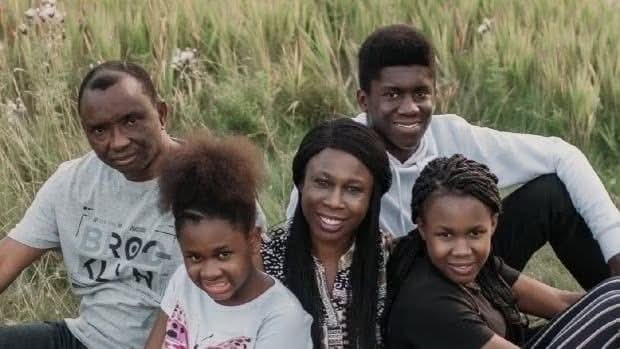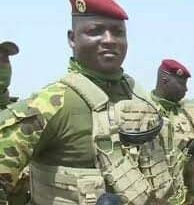I left my thriving life as a medical doctor in Nigeria to find a better future for my children in Canada—-Dr Iyaoromi
I lay in bed staring into the darkness while surrounded by the gentle murmur of the city sounds coming in from the window.
My mind drifted to my three children and their uncertain future in Nigeria. I imagined them, bright-eyed and hopeful, graduating one day into a world where their degrees might not translate to jobs and where they might live in a cycle of waiting and worry.
I could hear the quiet resignation in the voices of my patients, especially the elderly ones with chronic illnesses, who spoke of unemployed children they continued to support on meagre pensions.
As much as I loved Nigeria and had resisted the pull to leave, the future weighed heavily on my heart that night.
It was in that moment that I knew I had to give my children a different future.
Nigeria was my home. It’s where I grew up and where all my closest family and friends were. It’s also where I had become a doctor and felt a sense of purpose. I had spent years training and practising as a doctor and gained the respect of my colleagues and community. The familiarity with the health-care system, the network of professional connections I had nurtured and the opportunity to impact lives directly in my home country were deeply fulfilling.
But in 2018, with the support of my husband, I left my life in Nigeria to find a future for my children in Canada.
I used to be resolute in staying. Despite watching nearly half of my medical school classmates from the class of ’99 relocate to Europe, Canada or the U.S., I had also heard stories of individuals who were doctors in their home countries but, after relocating, ended up working as taxi drivers or in other unrelated jobs.
This left a significant impression on me. I could only imagine the emotional and psychological toll it must take on individuals who spent their early and active years building a career in medicine, only to find themselves unable to practice their profession after immigrating.
Reluctant to leave
One story I heard was of a taxi driver who had been in Canada for over 20 years but was unable to practise medicine because of the difficulties in passing the medical licensing exams.
It was a sobering reality that made me question whether the risk of starting over in a foreign country was worth it, especially with no guarantees I could practise as a medical doctor.
Migrating would mean giving up the stability of an established career, the support of family and friends and the satisfaction of contributing to the development of health care in my country.
These were not easy things to walk away from, which is why the decision to leave was not one I took lightly.
But with every patient who shared the burden of supporting unemployed children, my heart grew heavier.
I had always known the struggles they faced, but it wasn’t until I began picturing my own children in that same future that reality struck home.
A phone call from a friend in Canada changed my life. She told me they were looking for family physicians.
Iyaoromi presenting a report on weight bias among health-care providers in Vancouver, in 2022. Relocating from Nigeria to Canada meant foregoing the satisfaction of contributing to the development of health care in her home country. (Submitted by Omowumi Iyaoromi)
The idea was both thrilling and daunting — I was already in my 40s and had no idea how to navigate this unfamiliar path. The thought of preparing for my licensing exams to practise in Canada was overwhelming.
The process felt like a daunting uphill battle, requiring an immense amount of time, effort and financial resources — all while managing my responsibilities in Nigeria.
On top of that, I had to consider the practicalities of finding a home, enrolling my children in schools, understanding how everything from banking to health care worked and dealing with the emotional impact of leaving behind everything that was familiar. But I decided to take the leap of faith for my children’s future.
Kristel Cavazos has been working as the director of care in a Charlottetown seniors home for about five years. The immigrant from Mexico needed to take a pair of costly exams to be able to practise medicine on P.E.I. Retired family doctor Ed Pineau and Diane McQuaid, the community care home’s administrator, helped Cavazos cover the costs of the exams. 4:00
The process of immigrating was physically and mentally exhausting.
I failed my first English exam, but I persevered and passed it on the second attempt.
Over the next few years, I found myself in a relentless battle preparing for the Medical Council of Canada Evaluating Examination, travelling all the way to Ghana — the nearest country with a test centre at the time — and meticulously organizing my documents for job applications in Alberta and British Columbia.
The journey was anything but smooth. It took countless late nights, pouring over immigration forms and college requirements, all in pursuit of one goal: securing a medical job in Canada.
After months of perseverance, my efforts finally paid off with a job interview opportunity in British Columbia. There was a shortage of family physicians, particularly in rural communities, creating a need for foreign-trained doctors to help bridge the gap. The road was long, but every sleepless night brought me one step closer to my dream.
In Aug. 2017, I travelled to Canada to attend a preparatory course and undergo clinical assessments over the course of four months. By the grace of God, I successfully passed all these exams.
After years of preparation, setbacks and small victories, I was finally given the opportunity to work as a physician in Canada. I was 44 when my family and I moved.
A warm welcome
Arriving in Prince George, B.C., I was met with an unforgettable welcome: thick snow blanketing the ground — a record snowfall since 1948. But the warmth of the people soon melted away any trepidation.
Iyaoromi was presented with a cake at a send-off party on her last day at work in Prince George, B.C., in July 2022. (Submitted by Omowumi Iyaoromi)
From colleagues to neighbours to the church community, the people of Prince George enveloped my family in kindness and support. They helped us create a sense of home even in this unfamiliar land.
Welcome to Canada Majority of immigrants have trouble finding employment matching their expertise: survey
CBC Investigates This foreign worker says he paid his own wages for a cook position that didn’t exist
However, there were new challenges in practising medicine in Canada, such as navigating the differences in medications. The names of medications, often generic versus branded, varied greatly. Medications I was familiar with back home sometimes had completely different names or weren’t available at all. This meant I had to relearn drug names and familiarize myself with the Canadian pharmacological landscape to provide accurate and effective care.
Beyond the technical aspects, there was also the challenge of adapting to a different cultural terrain. Canada’s multicultural society brought diverse patient backgrounds, beliefs and expectations about health care that were quite different from my experiences back home. I had to learn to approach patient care with cultural sensitivity, recognizing that what worked in one cultural context might not be effective or appropriate in another.
These challenges stretched me, but they also deepened my understanding of patient-centred care. They pushed me to become a more adaptable and culturally-aware physician, ultimately shaping the way I practise medicine today.
The Iyaoromi family poses for a photo during Faith’s graduation from Cedars Christian School in Prince George, B.C., in 2022. From left, husband Stephen, daughter Gloria, son Daniel, daughter Faith and Iyaoromi. (Submitted by Omowumi Iyaoromi)
Adjusting to life in Canada also had its challenges. My husband found the weather particularly difficult at first — the bitter cold and long winters were a stark contrast to what we were used to. Thankfully, he has adapted well over time and is now used to it.
For our children, the accent and making new friends presented the biggest hurdles. It wasn’t easy navigating a new cultural environment as teenagers. But I am thankful that they have adjusted well. They’ve made good friends, and sometimes when they speak, I can barely make out what they’re saying. I jokingly remind them to switch to their Nigerian accent when talking to me.
After four years in Prince George, it felt like home. However, for family reasons, we had to make the difficult decision to relocate to Alberta. Though it was a significant change for our family, I remain grateful to continue my work as a family physician in Edmonton, where I am part of a wonderful team of physicians, allied health professionals and administrative staff who make every day fulfilling.
By the grace of God, our family has continued to thrive. Our first child has completed his undergraduate degree and is now working in his desired field. Our second child is in her third year at university and taking advantage of opportunities to work and volunteer — building experiences that will serve her well in the future. Our youngest is almost done with high school and has been actively involved in volunteer work and leadership roles within her school.
Watching them grow, adapt, and excel in their new environment fills me with immense gratitude and reaffirms that the sacrifices were worth every effort.
Through it all, God’s grace has been our anchor, guiding us through each step of this journey.
Dr. Omowumi Iyaoromi (Dr. Wumi) is a family physician, wellness coach and founder of the Carolad Empowerment Foundation, which supports single-parent families. Above all, she is a wife and mother, dedicated to creating opportunities for her children and uplifting others through her story.
.





